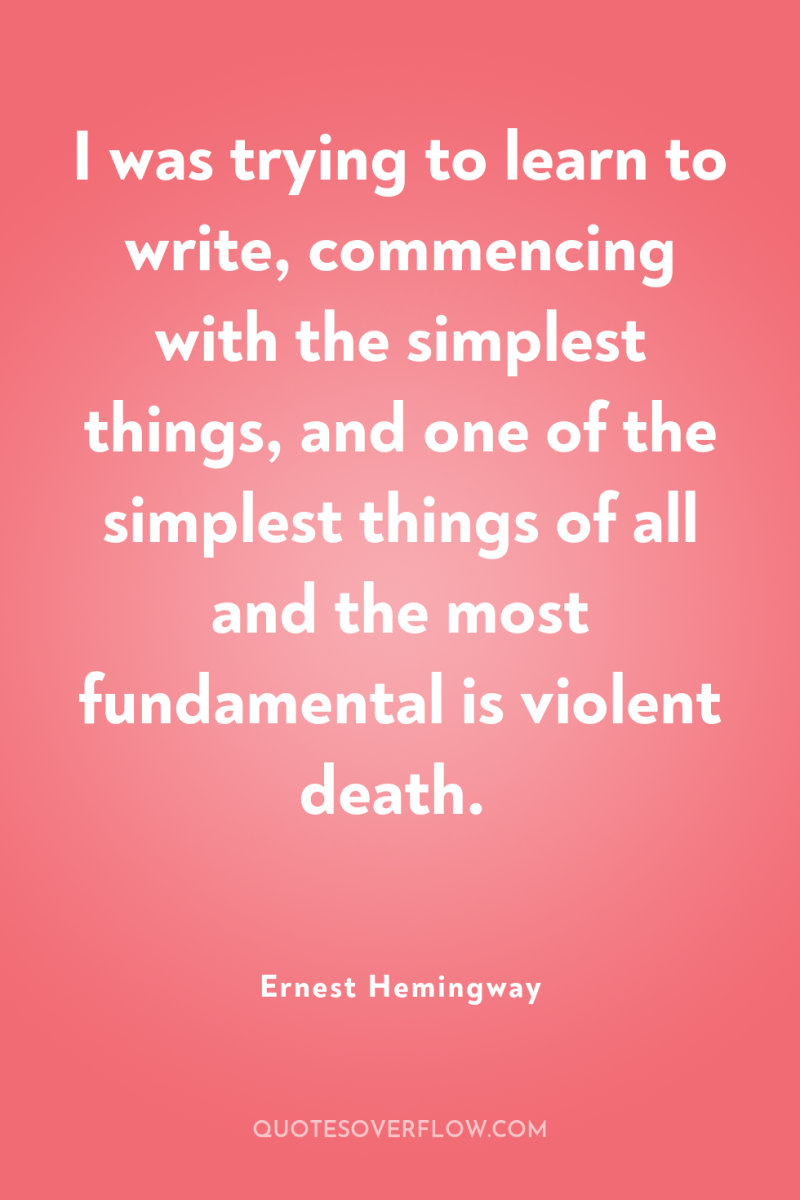
1
Let those who want to save the world if you can get to see it clear and as a whole. Then any part you make will represent the whole if it's made truly. The thing to do is work and learn to make it.Ernest Hemingway

2
I was trying to learn to write, commencing with the simplest things, and one of the simplest things of all and the most fundamental is violent death.Ernest Hemingway
3
When writing a novel a writer should create living people; people not characters. A character is a caricature. If a writer can make people live there may be no great characters in his book, but it is possible that his book will remain as a whole; as an entity; as a novel. If the people the writer is making talk of old masters; of music; of modern painting; of letters; or of science then they should talk of those subjects in the novel. If they do not talk of these subjects and the writer makes them talk of them he is a faker, and if he talks about them himself to show how much he knows then he is showing off. No matter how good a phrase or a simile he may have if he puts it in where it is not absolutely necessary and irreplaceable he is spoiling his work for egotism. Prose is architecture, not interior decoration, and the Baroque is over. For a writer to put his own intellectual musings, which he might sell for a low price as essays, into the mouths of artificially constructed characters which are more remunerative when issued as people in a novel is good economics, perhaps, but does not make literature. People in a novel, not skillfully constructed characters, must be projected from the writer’s assimilated experience, from his knowledge, from his head, from his heart and from all there is of him. If he ever has luck as well as seriousness and gets them out entire they will have more than one dimension and they will last a long time. A good writer should know as near everything as possible. Naturally he will not. A great enough writer seems to be born with knowledge. But he really is not; he has only been born with the ability to learn in a quicker ratio to the passage of time than other men and without conscious application, and with an intelligence to accept or reject what is already presented as knowledge. There are some things which cannot be learned quickly and time, which is all we have, must be paid heavily for their acquiring. They are the very simplest things and because it takes a man’s life to know them the little new that each man gets from life is very costly and the only heritage he has to leave. Every novel which is truly written contributes to the total of knowledge which is there at the disposal of the next writer who comes, but the next writer must pay, always, a certain nominal percentage in experience to be able to understand and assimilate what is available as his birthright and what he must, in turn, take his departure from. If a writer of prose knows enough about what he is writing about he may omit things that he knows and the reader, if the writer is writing truly enough, will have a feeling of those things as strongly as though the writer had stated them. The dignity of movement of an ice-berg is due to only one-eighth of it being above water. A writer who omits things because he does not know them only makes hollow places in his writing. A writer who appreciates the seriousness of writing so little that he is anxious to make people see he is formally educated, cultured or well-bred is merely a popinjay. And this too remember; a serious writer is not to be confounded with a solemn writer. A serious writer may be a hawk or a buzzard or even a popinjay, but a solemn writer is always a bloody owl.Ernest Hemingway
4
Find what gave you emotion; what the action was that gave you excitement. Then write it down making it clear so that the reader can see it too. Prose is architecture, not interior decoration, and the Baroque is over.Ernest Hemingway
5
I was trying to write then and I found the greatest difficulty, aside from knowing what you really felt, rather that what you were supposed to feel, and had been taught to feel, was to put down what really happened in action; what the actual things which produced the emotion that you experienced...Ernest Hemingway
6
This too to remember. If a man writes clearly enough any one can see if he fakes. If he mystifies to avoid a straight statement, which is very different from breaking so-called rules of syntax or grammar to make an efffect which can be obtained in no other way, the writer takes a longer time to be known as a fake and other writers who are afflicted by the same necessity will praise him in their own defense. True mysticism should not be confused with incompetence in writing which seeks to mystify where there is no mystery but is really only the necessity to fake to cover lack of knowledge or the inability to state clearly. Mysticism implies a mystery and there are many mysteries; but incompetence is not one of them; nor is overwritten journalism made literature by the injection of a false epic qulaity. Remember this too: all bad writers are in love with the epic.Ernest Hemingway
7
Every novel which is truly written contributes to the total of knowledge which is there at the disposal of the next writer who comes, but the next writer must pay, always, a certain nominal percentage in experience to be able to understand and assimilate what is available as his birthright and what he must, in turn, take his departure from. If a writer of prose knows enough about what he is writing about he may omit things that he knows and the reader, if the writer is writing truly enough, will have a feeling of those things as strongly as though the writer had stated them. The dignity of movement of an ice-berg is due to only one-eighth of it being above water. A writer who omits things because he does not know them only makes hollow places in his writing. A writer who appreciates the seriousness of writing so little that he is anxious to make people see he is formally educated, cultured or well-bred is merely a popinjay. And this too remember; a serious writer is not to be confounded with a solemn writer. A serious writer may be a hawk or a buzzard or even a popinjay, but a solemn writer is always a bloody owl. .Ernest Hemingway
8
All our words from loose using have lost their edge.Ernest Hemingway
9
If I had waited long enough I probably never would have written anything at all since there is a tendency when you really begin to learn something about a thing not to want to write about it but rather to keep on learning about it always and at no time, unless you are very egotistical, which, of course, accounts for many books, will you be able to say: now I know all about this and will write about it.Ernest Hemingway
10
It must be most dangerous then to be a man. It is indeed, madame, and but few survive itErnest Hemingway
11
So far, about morals, I know only that what is moral is what you feel good after and what is immoral is what you feel bad after.Ernest Hemingway
12
To go to bed at night in Madrid marks you as a little queer. For a long time your friends will be a little uncomfortable about it. Nobody goes to bed in Madrid until they have killed the night. Appointments with a friend are habitually made for after midnight at the cafe.Ernest Hemingway